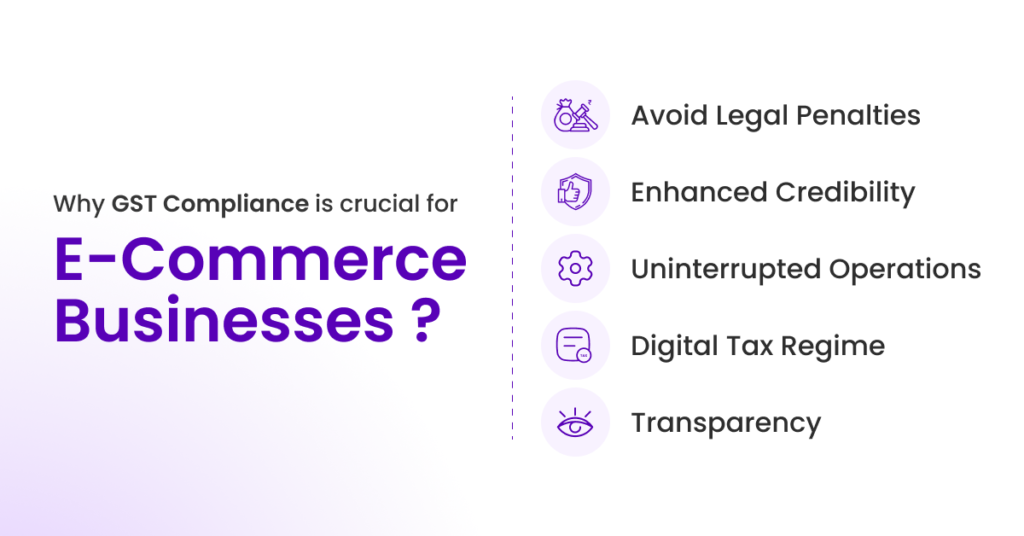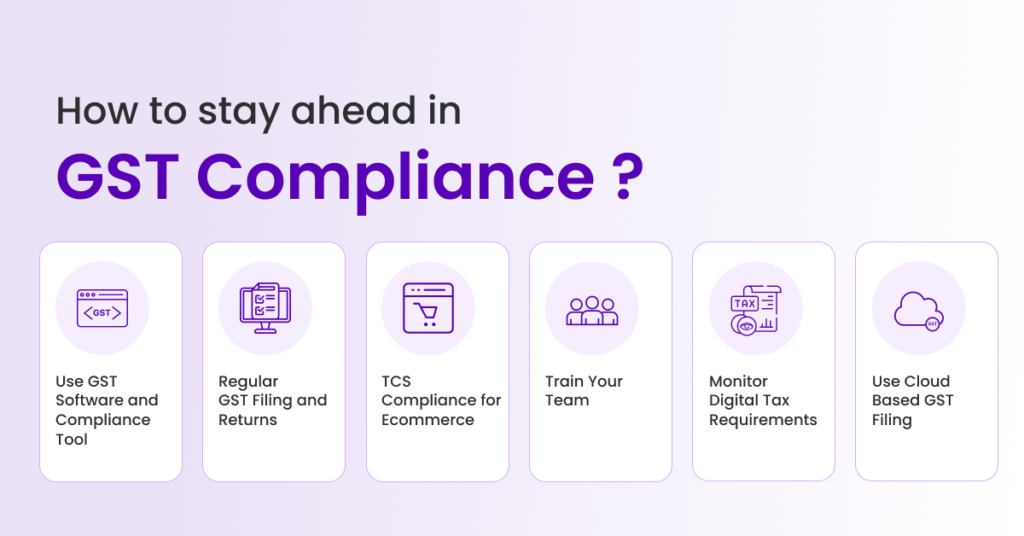Table of Contents
Compliance GST is vital for shopaver e-commerce success. Missing filings can trigger penalties and stress, while proper compliance builds trust and keeps your business running smoothly.
For this reason, let us explore GST for ecommerce businesses, its key features, why it is crucial for e-commerce, and how to stay ahead in GST compliance.
Compliance GST: Understanding GST for E-commerce Businesses
For e-commerce businesses, compliance GST is not just a legal necessity but also a vital part of ensuring smooth operations. GST rules have become more essential than ever as the government is focusing on digital tax collection.
Goods and Services Tax is a mandatory rule for every e-commerce business, as non-compliance may lead to operational disruptions, reputational damage, and legal penalties.
Key Features of GST for E-commerce
- Mandatory Registration – Unlike other businesses, it is necessary for e-commerce operators to GST Registration.
- TCS Compliance – Every e-commerce operator must collect Tax Collected at Source (TCS) at a rate of 1% on net taxable supplies conducted through their platform.
- Interstate Transaction – Businesses engaged in interstate trade must have GST filing.
- Regular GST Filing – E-commerce businesses must file multiple GST returns, including GSTR-1, GSTR 3B and more.
- Input Tax Credit (ITC) – To reduce the overall tax liability, every ecommerce business can claim ITC on their purchases.
Why compliance GST is Crucial for E-Commerce Businesses

- Avoid Legal Penalties – If your business is not compliant with GST rules it may lead to penalties, interest on unpaid tax or even suspension of your business operations. If you stay compliant with GST it will ensure that your business follows all the laws and operates smoothly.
- Enhanced Credibility -Vendors or customers prefer dealing with businesses that are tax compliant. If your e-commerce business shows professionalism and builds trust in the market, it will be possible for you to attract more people toward it.
- Uninterrupted Operations – Businesses that are not GST compliant can face disruptions like delayed shipments due to tax-related issues. Therefore, your business needs to be GST compliant to stay ahead.
- Digital Tax Regime – The government has focused on digital tax collection which has also allowed the ecommerce platforms to align with regulatory expectations through compliance GST.
- Transparency – It ensures transparency to avoid disputes with the customers, suppliers, and the tax authorities during tax reporting. Accurate GST filing provides clarity regarding tax liabilities which helps businesses manage their cash flow and plan finances effectively.
How to Stay Ahead in compliance GST

- Use GST Software and Compliance Tools– You should invest in strong software that automates tax calculations, GST filing, and return submissions. This will also help your ecommerce business to stay updated with the latest GST rules and ensure error-free operations.
- Regular GST Filing and Returns – It is important for your e-commerce business to file GST returns timely to navigate challenging tax scenarios. Many compliance GST tools that offer guidance for filing.
- Train Your Team – Your team should be aware of the GST rules and the importance of compliance GST, as it will prevent errors in filings and tax calculations.
- Monitor Digital Tax Requirements – If you own an ecommerce business, you need to stay updated on digital tax regulations, so that you can adapt to them quickly.
- TCS Compliance for Ecommerce – GST software includes features to manage TCS compliance effectively, therefore, ensuring accurate calculations and reporting is important.
- Use Cloud Based GST Filing – Tax filing online allows your ecommerce business to access the tax data anytime and anywhere, to provide you with flexibility.
compliance GST plays an important role in growing your ecommerce business, as it simplifies the tax structure, expands your market reach, and promotes transparency that builds trust and loyalty among the customers.
Regular GST filing and utilizing compliance tools keep your ecommerce business stay ahead in the market by avoiding the legal penalties. With the help of the right strategies and tools, your ecommerce business can remain competitive in the realm of digital taxation.
Frequently Asked Questions (FAQs)
2. Is GST registration mandatory for e-commerce businesses?
Yes, GST registration is mandatory for e-commerce operators, regardless of their turnover. Unlike other businesses, e-commerce platforms are required to register under GST to stay compliant with tax rules and regulations.
3. What is TCS compliance, and how does it apply to e-commerce GST?
TCS (Tax Collected at Source) compliance mandates e-commerce operators to collect 1% of the net taxable supplies conducted through their platform. This ensures accurate reporting and collection of taxes, which is a crucial part of e-commerce tax compliance.

Aachal has 5+ years of experience in retail technology and POS-related content, writing practical and insight-driven blogs for small businesses in India.



